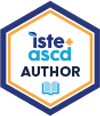
Event Information

Station topics will include (among other topics):
Introduction of a rubric (based on the ISTE Standards) that allows teachers to self-reflect on how they are utilizing technology in their daily classrooms, and if it is the most effective use of technology, and how it can be used for accreditation purposes.
Introduction to the new CAST guidelines for UDL 3.0
Utilizing padlet and AI for icebreakers and online conversations.
Designing online asynchronous courses so they don't add to student cognitive overload.
Bringing student teachers into the world of AI.
Infusing technology and the ISTE Standards into methods courses
This is not a simple set of academic papers that playground attendees will passively listen to! Our goal is to provoke rich ideas and interactions at each playground station. We hope attendees will take away research and experience-based strategies that they can try immediately, or reflect on for future teaching. All stations have practical implications for both higher educators and K-12 educators. Beyond what the presenters share, this will be an opportunity for a larger sharing of ideas and resources and ideas that will be compiled and shared in a Wakelet that attendees can access.
Examples of takeaways, might be:
New ways of connecting AI with future teachers who have little experience with it - or think they do!
New ideas for assessing technology use in teaching.
Realistic reflections on how students are seeing issues of diversity and inclusion in higher education, especially in on online environment.
New ideas for online teaching that consider students' well-being.
We will be adding to this research as we add presenters to our playground:
Bhattacharya, K. (2017). Fundamentals of qualitative research: A practical guide. Routledge.
Buss, R. R., Wetzel, K., Foulger, T. S., & Lindsey, L. (2015) Preparing teachers to integrate technology into K–12 instruction: Comparing a stand-alone technology course with a technology-infused approach, Journal of Digital Learning in Teacher Education, 31:4, 160-172, DOI: 10.1080/21532974.2015.1055012
Buss, R. R., Foulger, T. S., Wetzel, K. & Lindsey, L. (2018) Preparing teachers to integrate technology into K–12 Instruction II: Examining the effects of technology-infused methods courses and student teaching, Journal of Digital Learning in Teacher Education, 34:3, 134-150, DOI: 10.1080/21532974.2018.1437852
Chang, H., Wambura Ngunjiri, F., & Hernandez, K.-A. C. (2013). Collaborative Autoethnography. Routledge.
“ISTE Standards: Educators.” ISTE, www.iste.org/standards/iste-standards-for-teachers.
Missouri teacher standards alignment with INTASC and ISTE standards 1. (n.d.). Retrieved May 25, 2022, from https://www.missouristate.edu/assets/caep/1-1-1_StandardsAlignment.pdf
NAEYC (2013). Technology and Interactive Media as Tools in Early Childhood Programs Serving Children from Birth through Age 8.
https://www.naeyc.org/sites/default/files/globally-shared/downloads/PDFs/resources/position-statements/ps_technology.pdf
Salman, J. (2023, June 8). How college educators are using AI in the classroom. The Hechinger Report. https://hechingerreport.org/how-educators-are-using-ai-in-the-classroom/
Tolliver, S. R. (2022). Recovering Black storytelling in qualitative research: endarkened storywork. Routledge.
U.S. Department of Education and ISTE Launch Initiative to Improve Tech Proficiency of New Teachers to Increase Digital Equity, 2022, ISTE
https://www.iste.org/explore/press-releases/us-department-education-and-iste-launch-initiative-improve-tech-proficiency
Vavasseur, C. B. (2022, August 25). A rubric for effective Edtech use. Edutopia. https://www.edutopia.org/article/rubric-effective-edtech-use
Wetzel, K., Buss, R., Foulger, T. S. & Lindsey, L. (2014) Infusing educational technology in teaching methods courses: Successes and dilemmas, Journal of Digital Learning in Teacher Education, 30:3, 89-103, DOI: 10.1080/21532974.2014.891877
Windchief, S. & San Pedro, T. (Eds.). (2019). Applying indigenous research methods: Storying with peoples and communities. Routledge.








| Related exhibitors: | Solution Tree, Center For Responsive Schools, National PTA, Teaching Channel |